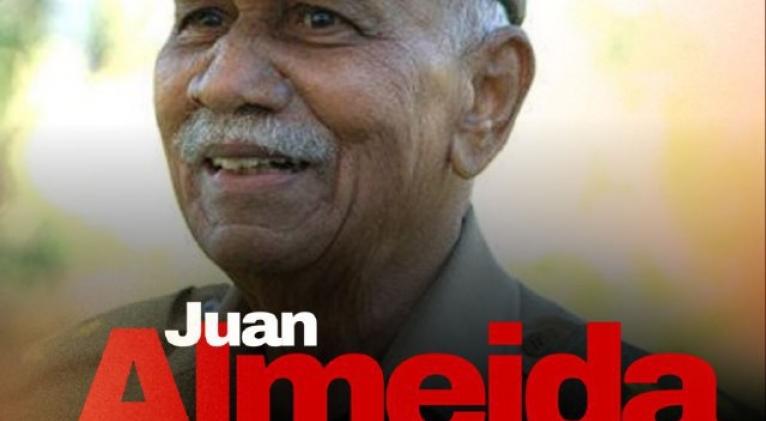The permanent legacy of Juan Almeida
especiales

The Commander of the Revolution Juan Almeida Bosque is still present among Cubans, 15 years after his death in Havana at an advanced age, on September 11, 2009, after a life of total dedication to the Homeland from the path he chose very early on, that of being a freedom fighter and dedicating himself to the transforming work he always accomplished.
This human being was a great man distinguished by a naturalness and humility that impressed from his treatment to the mark printed in everything he did, noble, rooted and well felt, as proclaimed by his heart of Cuban patriot.
That is why he has a place among the pillars of the triumphant Revolution on January 1st, 1959, and due to his legacy of revolutionary soldier of the underground incorporated to tasks since very young, in his hometown in the outskirts of the capital, and then expeditionary of the Granma yacht.
The life of this Cuban born on February 17, 1927, who fulfilled the duty dictated by his conscience of being an outstanding combatant with weapons in his hand, politician, military, father and grandfather, composer of beautiful songs and author of testimonial books that enrich the history of Cuba, was fruitful.
His bravery, daring and courage were admirable, as well as his naturalness and the expression of his noble and kindly countenance, giving him a charisma that also won him many hearts.
In his case, perhaps that is the secret of the permanent admiration awakened by his memory, a trail of soft and firm brightness with many edges and sobering teachings for his fellow countrymen, whether they were his contemporaries or not.
The sons and daughters of the eastern city of Santiago de Cuba, where he worked for some years in political leadership responsibilities, evoke him with great affection and emotion, for his ability to work and face challenges, and also for his humanism with the neighbors of his communities, and his beautiful music, so much liked in that region as in the rest of the country.
Some memories about his existence are not bad because the energy and political convictions that he raised coincided with those of the rest of the group of Granma expeditionaries to which he belonged. What happened later in Alegría de Pío marked him as a representative of the lineage of human beings never surrendered by the most terrible circumstances.
In spite of the military defeat suffered by the rebels, the voice of Juan Almeida Bosque, vigorously shouting: “Nobody surrenders here, C...!
He had previously been an assailant of the Moncada Barracks on July 26, 1953 and followed the leader of the daring action, Fidel Castro, as a political prisoner and ardent comrade of the cause in the prison misnamed Presidio Modelo, on the then Isle of Pines.
He left prison with his revolutionary convictions strengthened, along with other released comrades, at the moment when popular pressure and the very mobilization inspired by the Commander in Chief of the Revolution from the prison, forced the criminal usurper president to issue an amnesty in May 1955.
He immediately participated in the founding of the 26th of July Revolutionary Movement and, like his comrades in struggle, his awareness that the tyrant would intensify the persecution and viciousness against the patriots matured.
They then decided to go into exile, to Mexico, and among the continuators willing to continue fighting with weapons in hand, since the possibilities of other ways were denied, the Havana bricklayer could not be absent.
Juan Almeida always showed a vanguard performance from the first moments that marked the birth of the Rebel Army already in the vicinity of the Sierra Maestra.
After receiving two wounds in the combat of El Uvero, one of the first, he continued to show more and more his military expertise, won inch by inch, until he became the guerrilla commander who had the honor of founding the Third Eastern Front, in the area near the heroic Santiago de Cuba.
When the Revolution triumphed, he advanced along with Camilo and Che, towards Havana with his forces to consolidate the rebel victory that the enemy was already trying to prevent, under instructions from the empire, and from there he awaited the triumphal arrival of Fidel Castro with the bulk of the popular army, in the Caravan of Freedom.
He never stopped being fast and was never seen lagging behind, although his appearance conveyed serenity and no haughtiness. He continued fulfilling missions and improving himself in the military and cultural fields, always with one foot in the stirrup, like the old mambises, to continue fighting all the battles imposed by the construction of Cuban socialism.
He was a member of the Central Committee and the Political Bureau of the Party since its foundation in 1965, and was ratified in all its Congresses. In addition, he served as deputy to the National Assembly and vice-president of the Council of State, from the first legislature of the Parliament.
Beloved and admired hero, his imprint transmits a message of encouragement and confidence in the future, of unwavering certainty in victory, as long as the vocation of struggle is maintained.
Life rewarded him by providing him with a quality that facilitated the composition of beautiful melodies and song lyrics. He was a sort of poet or popular minstrel, whose sensitivity knew how to capture and express feelings and essences to express them in a synthetic and direct way, without vulgarity.
He turned out to be a composer of a very inspired, beautiful, melodic and harmonious music, which always transmitted the keys of his admirable character, his joy and all the virtues that sprang from him, with a quality that no one doubts.
More than 300 songs and a dozen literary works were bequeathed to us by this Hero of the Republic of Cuba, who was also decorated with the Maximo Gomez Order of the first degree.
Juan Almeida Bosque was the second son of a humble Havana couple who knew how to educate with values and patriotism a brood of 12 children, whom the future Commander of the Rebel Army helped to support from an early age, because the sense of responsibility and love for the family were notorious in him all his life.














Add new comment